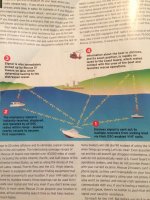Ronnie
Jetboaters Fleet Admiral
- Messages
- 8,775
- Reaction score
- 12,188
- Points
- 667
- Location
- SF Bay Area
- Boat Make
- Yamaha
- Year
- 2010
- Boat Model
- Limited S
- Boat Length
- 24
A few years ago I bought a hand held marine radio from Westmarine that I have never used and until now thought of as old tech. Per an article in this months edition of Boat U.S. Magazine (page 36) I realize I couldn't have been more wrong. Here is a pic of the illustration in the article. Points 1 through 4 are only possible with a vhf radio not a cell phone, the most important feature being the ability to locate the distressed vhf user. Anyone ever hear of the Coast Guard's Rescue 21 system that blanket 40k miles of US coast line?

I hope that I never have to make a distress call from the water but if I do I hope that I remember to use my vhf radio.

I hope that I never have to make a distress call from the water but if I do I hope that I remember to use my vhf radio.

